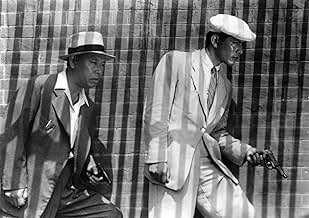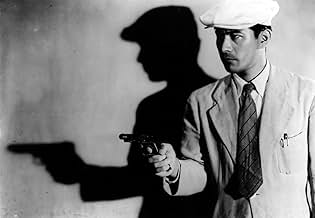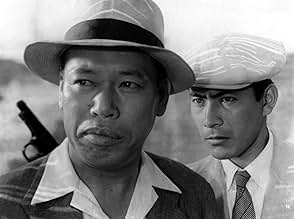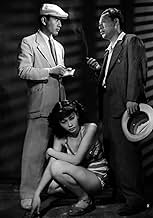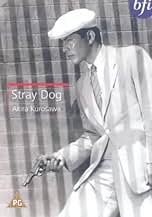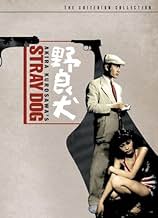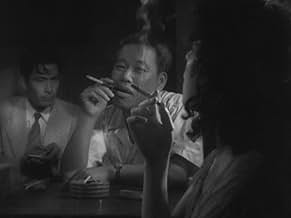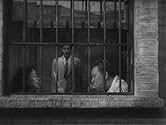Murukami, un joven detective de homicidios, pierde su pistola reglamentaria durante un trayecto en autobús. Agobiado por el sentimiento de deshonor más que por la pérdida trata infructuosame... Leer todoMurukami, un joven detective de homicidios, pierde su pistola reglamentaria durante un trayecto en autobús. Agobiado por el sentimiento de deshonor más que por la pérdida trata infructuosamente de recuperar el arma.Murukami, un joven detective de homicidios, pierde su pistola reglamentaria durante un trayecto en autobús. Agobiado por el sentimiento de deshonor más que por la pérdida trata infructuosamente de recuperar el arma.
- Dirección
- Guionistas
- Elenco
- Premios
- 4 premios ganados en total
- Dirección
- Guionistas
- Todo el elenco y el equipo
- Producción, taquilla y más en IMDbPro
Opiniones destacadas
Toshiro Mifune, looking young and handsome, is quite marvellous as the central character, a detective whose gun is stolen on a bus. What starts out as a detective nervous about finding his gun and fixing a silly mistake, develops into a frantic and desparate man who feels somehow responsible for whatever crimes are committed with his gun. The suspense and detective-story plot are well developed in Stray Dog, but what really makes the story captivating is the revelation of the central character's feeling of guilt throughout, and his learning about crime, criminals, and that what is important is to make good come of your mistakes.
A very young Toshiro Mifune plays the greenhorn detective who has his gun stolen and spends the rest of the movie trying to track down the culprit. As it turns out the culprit is a war veteran just like Mifune's character, only where the latter tried to do good and found an honest job, the former opted for the easy way out and became a criminal, using the stolen gun to rob and kill. This adds an additional layer of motivation for detective Sato. Not only does he have to restore his honour (ironically symbolised by the lost gun which he tries to retrieve), but also redeem himself by bringing the killer to justice. What makes matters worse for him is that every time his stolen gun is fired someone dies or gets injured, which adds another burden of guilt on the shoulders of the young detective.
The story might appear too moralistic and convenient (both antagonist and protagonist share a common background, being war veterans, making the distinction of good and bad all too easy), but it has to be seen in the context of the times. Mifune says that there are no bad people, only bad situations. But as his detective collaborator on the case remarks (played by the great Takashi Shimura, who also starred in Seven Samurai) he faced the same bad situation and made something good out of it. Kurosawa here neatly balances the social climate of post-war Japan and the conditions of the times with personal responsibility.
Story-wise it's a worthy effort, but like Rashomon, it sounds a little bit better than it actually is. Not that Stray Dog is a bad movie by any means, but clocking in at 2 hours it starts to drag near the middle. There are some nice set-pieces that showcase Kurosawa's growing talent (like the phone scene in the hotel where he uses inter-cutting to great effect) and the performances are solid all around. There's also a silent 10 minute montage of location footage shot in rundown neighborhoods as Sato searches the black market for his gun, which serves as a poignant snapshot of Japanese history.
Kurosawa would go on to achieve international acclaim with his next movie, Rashomon, but Stray Dog already shows that he was destined for great things. Compared to later entries in his filmography Stray Dog appears to be a minor entry, but it's still well worth the time to discover.
Surprisingly, 'Stray Dog' is similar in many regards to Vittorio De Sica's neorealist masterpiece 'The Bicycle Thief (1948).' Both films concern a disillusioned man's seemingly-futile search for an essential stolen object, in a city of poor and pitiable individuals, where, in the aftermath of World War Two, widespread economic difficulties have forced many towards a life of crime. When Det. Murakami first begins searching for his stolen gun, there is a wonderful extended sequence in which he purposelessly wanders the poverty-stricken streets, experiencing the decadence of society for himself, for the first time understanding why a criminal might have been forced to tread a darkened path. A very important theme of the film is the obvious parallel between Det. Murakami and his suspect, Yusa (Isao Kimura). Both individuals fell on hard times when their knapsacks were stolen: while the former took the crucial step towards law enforcement, the latter chose the opposite path, eventually becoming a thief and a wanted murderer. In the story's climactic chase sequence, the two men tussle violently in the undergrowth, their faces becoming coated in a layer of mud; for a decisive few moments, detective and criminal are practically indistinguishable from each other.
One component of film-making that Kurosawa had evidently mastered by 1949 was creating intensity, and, in many ways, 'Stray Dog' is simply discomforting to watch. The events of the film appear to take place during an extreme heatwave, and the perspiration clings to the skin of the actors as though they are practically roasting in their seats. When the story reaches a devastating climax, its arrival is heralded by the breaking of a storm, the passing of the sweltering drought perhaps symbolising that the dull, futile routine of police procedure has come to an end. I was also impressed by the frantic chase sequences at both the beginning and end of the film, which, aside from being exceptionally thrilling, were genuinely harrowing. Watching Murakami and Yusa grapple in the vegetation, before both collapsing to the ground in fatigue, I don't think I've ever seen film characters looking so utterly exhausted. Despite a masterful opening and closing, 'Stray Dogs' tended to drag a lot in the middle, with the two detectives moving from one possible witness to the other, very slowly gathering the information they require to track down their suspect. Nonetheless, I now have the massive undertaking of deciding which of Akira Kurosawa's films I will watch next.
¿Sabías que…?
- TriviaMuch of the film was filmed from the slum streets of post war Japan. These were filmed under chief assistant director Ishirô Honda, who had gone with camera operator Kazuo Yamada into some dangerous, even yakuza run, territory. Many of the scenes of Toshirô Mifune's character from the waist down are actually Honda standing in. In his book, Something Like an Autobiography, Akira Kurosawa described Honda's role stating, "I had Honda do mainly second-unit shooting. Everyday I told what I wanted and he would go out into the ruins of postwar Tokyo to film. There are few men as honest and reliable as Honda. He faithfully brought back exactly the footage I requested, so almost everything he shot was used in the final cut of the film. I'm often told that I captured the atmosphere of postwar Japan very well in Stray Dog, and if so I owe a great deal of that success to Honda."
- ErroresAt one point, there is a man playing a tune on a harmonica that needs two people with harmonicas to play.
- Citas
Police Inspector Nakajima: Bad luck either makes a man or destroys him. Are you gonna let it destroy you? Depending how you take it, bad luck can be a big break.
- ConexionesFeatured in La historia del cine: Una odisea: Sex & Melodrama (2011)
- Bandas sonorasThe Waves of the Danube
(uncredited)
Composed by Iosif Ivanovici
[Played on a harmonica outside the bar when Murakami follows Ogin]
Selecciones populares
- How long is Stray Dog?Con tecnología de Alexa
Detalles
- Fecha de lanzamiento
- País de origen
- Idiomas
- También se conoce como
- Stray Dog
- Locaciones de filmación
- Ameya Yokocho market, Ueno, Tokio, Japón(black market scenes)
- Productoras
- Ver más créditos de la compañía en IMDbPro
Taquilla
- Total en EE. UU. y Canadá
- USD 46,808
- Fin de semana de estreno en EE. UU. y Canadá
- USD 15,942
- 28 jul 2002
- Total a nivel mundial
- USD 47,023
- Tiempo de ejecución2 horas 2 minutos
- Color
- Mezcla de sonido
- Relación de aspecto
- 1.37 : 1
Contribuir a esta página



